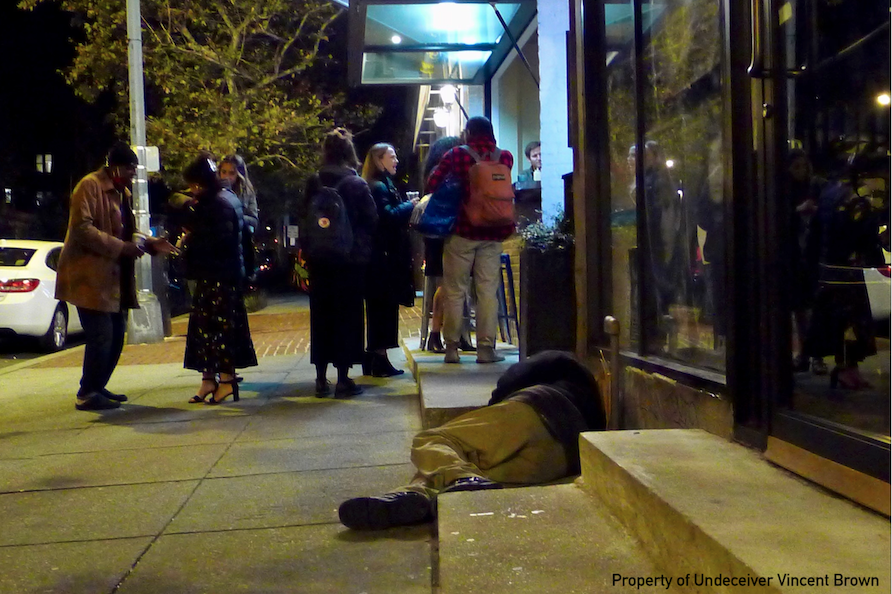Biden Defender James Clayburn says, 'Stutterin Ass Brandon Hasn’t Broken His Word to Build Book Butter Better Battle baby Back Ribs Biocide,' as Many Evicted Blacks 'Search for the Grate Outdoors'
/From [HERE] A new study investigates the impact of 2020 Covid-19 rental eviction moratoria on the wellbeing of US households, finding that eviction moratoria across the US resulted in a significant decrease in incidences of household food insecurity and mental stress, with larger effects evidenced among African American households.
In the wake of the Covid-19 pandemic and related disruption to economic activity, US weekly jobless claims in March 2020 skyrocketed to 7 million, roughly ten times that of peak levels recorded during the 2008 global financial crisis. According to the Census Household Pulse Survey, at the onset of the pandemic, the share of affordability constrained renters, defined as households paying more than one-half of their income on rent, jumped to one-half of all renter households.
Further, renter households had little wherewithal to withstand Covid-related employment shocks, given that, in addition to their lower average incomes, they have very little savings and wealth. Renter household net worth on average is only $6,300, compared to an average homeowner net worth of $255,000. To assure shelter of affordability-constrained renters and to damp the spread of the virus, many state and local governments in the US took the unprecedented steps of enacting moratoria on tenant eviction at the early stages of the pandemic, even before the CDC moratorium was implemented in September 2020. The Eviction Lab at Princeton estimates that the eviction moratorium helped prevent 1.55 million eviction filings, affecting more than 3.7 million people. Prior to the pandemic, the Eviction Lab estimated that over 1 million people were evicted from their homes each year.
Researchers have linked rental eviction to numerous adverse outcomes including those related to employment, homelessness, and future housing stability. Among health impacts, eviction is associated with anxiety, depression, high blood pressure, and declines in self-reported health overall. While eviction wears on people’s mental health in normal times, those stressors multiply during a period of pandemic. According to the US Census Household Pulse Survey, about 4 in 10 adults in the US reported symptoms of anxiety or depressive disorder in the wake of onset of the Covid-19 pandemic, up from 1 in 10 adults who reported these symptoms during 2019. Eviction moratoria assured renters of continued shelter during a period of elevated Covid-19 virus transmission, likely easing mental stress and anxiety among treated households. Further, moratoria on eviction and related deferral of rent may have provided treated households with financial relief by enabling households to re-direct scarce resources to other immediate consumption needs, including food purchases, and therefore lowering food insecurity.
Moratoria on rental eviction may have conferred a broad set of benefits on vulnerable households and the local economy. There is evidence of direct, intended impacts of eviction moratoria in lowering the number of eviction filings and reducing the spread of Covid-19. Kathryn Leifheit, a postdoctoral fellow at UCLA, estimated that during a six-month span of 2020, the expiration of state-level eviction bans were responsible for nearly 11,000 deaths and more than 430,000 cases of Covid-19 in the US. However, little is known about the indirect impact of eviction moratoria on other aspects of household well-being.
In a recent paper I co-authored with Stuart Gabriel (UCLA) and Xudong An (Philadelphia Fed), we use the staggered implementation of rental eviction moratoria , which was implemented by states in a haphazard manner throughout the March-August 2020 period, as an opportunity to identify the household impact of those interventions. For example, among states that enacted eviction moratoria, California was among the first to implement such measures in March 2020 while Virginia did not enact a state-level eviction moratorium until July. We use different data sources, such as the Federal Reserve financial institution supervisory data; Opportunity Insight Economic Tracker, the Census Covid-19 Household Pulse Survey, and Google Trends search query information to better understand the effects of eviction moratoria on household non-durable and food spending, food insecurity, and mental health.
We find that the implementation of state rental eviction moratoria led both to elevated credit card spending and debt payments. We also show a small but significant positive impact of rental eviction moratoria on borrowers’ credit score. We further distinguish between renters and homeowners to help our causal inference as renters, not homeowners, were the target beneficiaries of the eviction moratoria.
A new study investigates the impact of 2020 Covid-19 rental eviction moratoria on the wellbeing of US households, finding that eviction moratoria across the US resulted in a significant decrease in incidences of household food insecurity and mental stress, with larger effects evidenced among African American households.
In the wake of the Covid-19 pandemic and related disruption to economic activity, US weekly jobless claims in March 2020 skyrocketed to 7 million, roughly ten times that of peak levels recorded during the 2008 global financial crisis. According to the Census Household Pulse Survey, at the onset of the pandemic, the share of affordability constrained renters, defined as households paying more than one-half of their income on rent, jumped to one-half of all renter households.
Further, renter households had little wherewithal to withstand Covid-related employment shocks, given that, in addition to their lower average incomes, they have very little savings and wealth. Renter household net worth on average is only $6,300, compared to an average homeowner net worth of $255,000. To assure shelter of affordability-constrained renters and to damp the spread of the virus, many state and local governments in the US took the unprecedented steps of enacting moratoria on tenant eviction at the early stages of the pandemic, even before the CDC moratorium was implemented in September 2020. The Eviction Lab at Princeton estimates that the eviction moratorium helped prevent 1.55 million eviction filings, affecting more than 3.7 million people. Prior to the pandemic, the Eviction Lab estimated that over 1 million people were evicted from their homes each year.
Researchers have linked rental eviction to numerous adverse outcomes including those related to employment, homelessness, and future housing stability. Among health impacts, eviction is associated with anxiety, depression, high blood pressure, and declines in self-reported health overall. While eviction wears on people’s mental health in normal times, those stressors multiply during a period of pandemic. According to the US Census Household Pulse Survey, about 4 in 10 adults in the US reported symptoms of anxiety or depressive disorder in the wake of onset of the Covid-19 pandemic, up from 1 in 10 adults who reported these symptoms during 2019. Eviction moratoria assured renters of continued shelter during a period of elevated Covid-19 virus transmission, likely easing mental stress and anxiety among treated households. Further, moratoria on eviction and related deferral of rent may have provided treated households with financial relief by enabling households to re-direct scarce resources to other immediate consumption needs, including food purchases, and therefore lowering food insecurity.
Moratoria on rental eviction may have conferred a broad set of benefits on vulnerable households and the local economy. There is evidence of direct, intended impacts of eviction moratoria in lowering the number of eviction filings and reducing the spread of Covid-19. Kathryn Leifheit, a postdoctoral fellow at UCLA, estimated that during a six-month span of 2020, the expiration of state-level eviction bans were responsible for nearly 11,000 deaths and more than 430,000 cases of Covid-19 in the US. However, little is known about the indirect impact of eviction moratoria on other aspects of household well-being.
In a recent paper I co-authored with Stuart Gabriel (UCLA) and Xudong An (Philadelphia Fed), we use the staggered implementation of rental eviction moratoria , which was implemented by states in a haphazard manner throughout the March-August 2020 period, as an opportunity to identify the household impact of those interventions. For example, among states that enacted eviction moratoria, California was among the first to implement such measures in March 2020 while Virginia did not enact a state-level eviction moratorium until July. We use different data sources, such as the Federal Reserve financial institution supervisory data; Opportunity Insight Economic Tracker, the Census Covid-19 Household Pulse Survey, and Google Trends search query information to better understand the effects of eviction moratoria on household non-durable and food spending, food insecurity, and mental health.
We find that the implementation of state rental eviction moratoria led both to elevated credit card spending and debt payments. We also show a small but significant positive impact of rental eviction moratoria on borrowers’ credit score. We further distinguish between renters and homeowners to help our causal inference as renters, not homeowners, were the target beneficiaries of the eviction moratoria.







































































































































































































































































